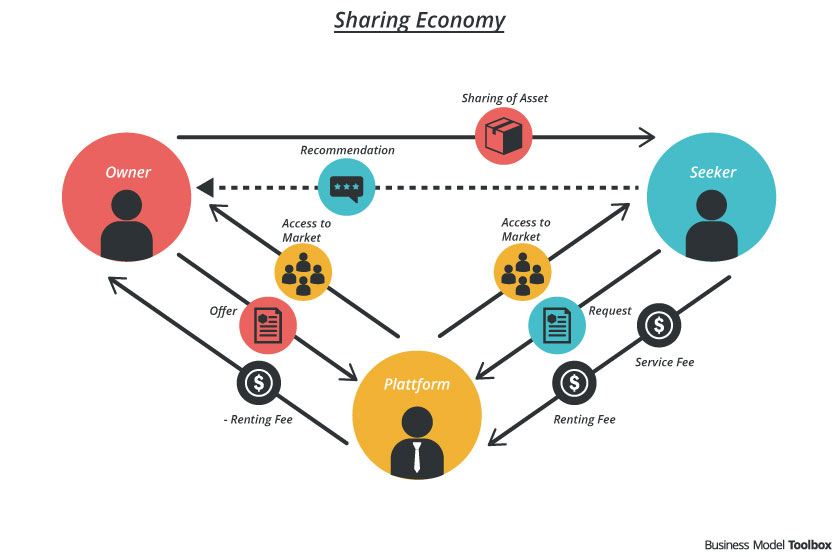Sharing Economy
Tags
Description
What’s different now is the introduction of technology into the concept.”
H.O. Maycotte, Umbel
Sharing economy means “What is mine is yours, for a fee” (The Economist) and is becoming more and more popular across all kinds of assets: flats, cars, transportation, tools, toys. In 2011, sharing was nominated as one of the “10 ideas that will change the world“. The most common revenue model of the platform provider is to charge a service fee for the matchmaking service
The main features of a sharing economy business model are:
- Access instead of ownership: rather than buying an asset, the seeker rents it from someone else
- A platform brings together owners and seekers and facilitates all processes between them
- The business / platform itself does not possess any of the assets on offer: Airbnb does not own a single room, Zipcar not a single car
Success factors
Examples
Offers the possibility for home owners to share their home space with travelers.
Uber
Car-owners are enabled to offer rides to passengers
Blablacar
Enables matching of drivers and passengers to share the fuel cost of the ride.
Dogvacay
Find the perfect pet sitter near you.
LendingClub
The world’s largest marketplace for peer-to-peer loans
Neighborgoods
Share goods with your friends and neighbors
Chances
- Low risk as the platform owner does not need to invest in fixed assets
- Sustainable use of materials: instead of producing, it is about optimizing the usage of existing products
- Owner can earn extra money
- Seeker does not buy the product and can simply pay for the time he is using the product
Risks
- Trust among the users is the most important currency – Fraud and abuse of even a small percentage of users, e.g. damaging property, can threaten the whole business
- Building a critical mass: there need to be enough participants on both sides – owners and seekers
- Accountability and liability issues for the platform owner can threaten the business
Responsibility
Resources
- Entrepreneurial Insights: An introduction to sharing economy
- Rachel Botsman’s book Whats Mine is Yours: The Rise of Collaborative Consumption and webpage with interesting resources
- PWC: Study on Sharing Economy
- Business Insider: Why The Success Of ‘Sharing Economy’ Startups Hinges On Who Owns The Inventory

